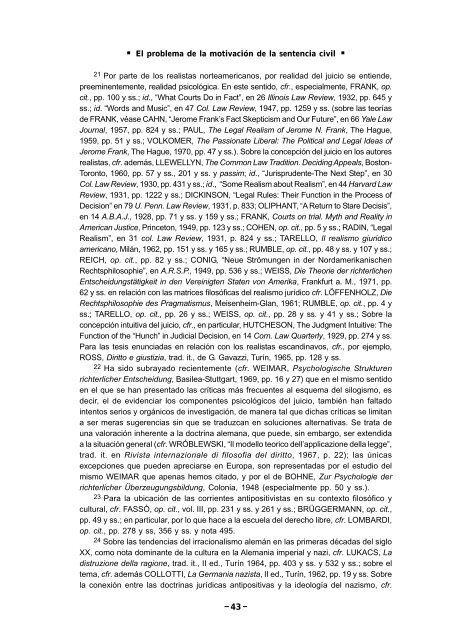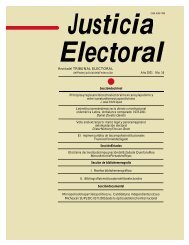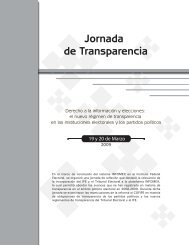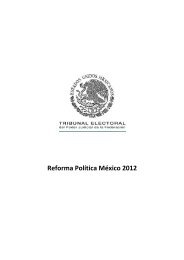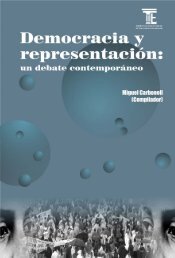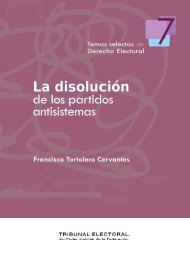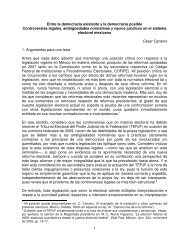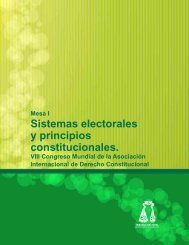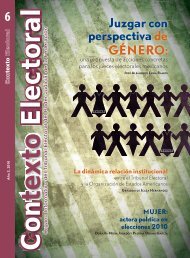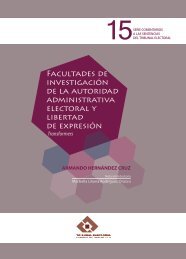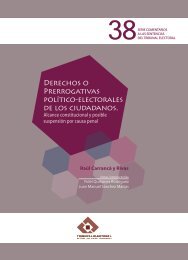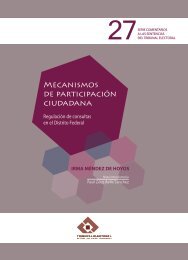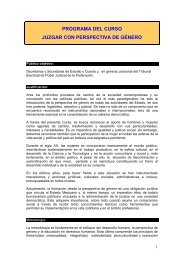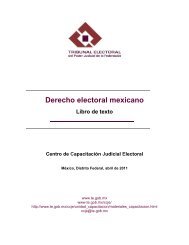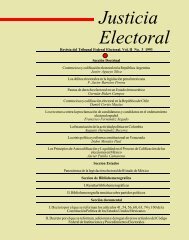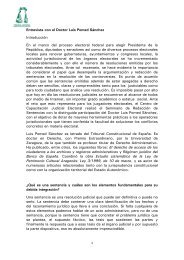La Motivación de la Sentencia Civil - Tribunal Electoral del Poder ...
La Motivación de la Sentencia Civil - Tribunal Electoral del Poder ...
La Motivación de la Sentencia Civil - Tribunal Electoral del Poder ...
Create successful ePaper yourself
Turn your PDF publications into a flip-book with our unique Google optimized e-Paper software.
El problema <strong>de</strong> <strong>la</strong> motivación <strong>de</strong> <strong>la</strong> sentencia civil<br />
21 Por parte <strong>de</strong> los realistas norteamericanos, por realidad <strong>de</strong>l juicio se entien<strong>de</strong>,<br />
preeminentemente, realidad psicológica. En este sentido, cfr., especialmente, FRANK, op.<br />
cit., pp. 100 y ss.; id., “What Courts Do in Fact”, en 26 Illinois <strong>La</strong>w Review, 1932, pp. 645 y<br />
ss.; id. “Words and Music”, en 47 Col. <strong>La</strong>w Review, 1947, pp. 1259 y ss. (sobre <strong>la</strong>s teorías<br />
<strong>de</strong> FRANK, véase CAHN, “Jerome Frank’s Fact Skepticism and Our Future”, en 66 Yale <strong>La</strong>w<br />
Journal, 1957, pp. 824 y ss.; PAUL, The Legal Realism of Jerome N. Frank, The Hague,<br />
1959, pp. 51 y ss.; VOLKOMER, The Passionate Liberal: The Political and Legal I<strong>de</strong>as of<br />
Jerome Frank, The Hague, 1970, pp. 47 y ss.). Sobre <strong>la</strong> concepción <strong>de</strong>l juicio en los autores<br />
realistas, cfr. a<strong>de</strong>más, LLEWELLYN, The Common <strong>La</strong>w Tradition. Deciding Appeals, Boston-<br />
Toronto, 1960, pp. 57 y ss., 201 y ss. y passim; id., “Jurispru<strong>de</strong>nte-The Next Step”, en 30<br />
Col. <strong>La</strong>w Review, 1930, pp. 431 y ss.; id., “Some Realism about Realism”, en 44 Harvard <strong>La</strong>w<br />
Review, 1931, pp. 1222 y ss.; DICKINSON, “Legal Rules: Their Function in the Process of<br />
Decision” en 79 U. Penn. <strong>La</strong>w Review, 1931, p. 833; OLIPHANT, “A Return to Stare Decisis”,<br />
en 14 A.B.A.J., 1928, pp. 71 y ss. y 159 y ss.; FRANK, Courts on trial. Myth and Reality in<br />
American Justice, Princeton, 1949, pp. 123 y ss.; COHEN, op. cit., pp. 5 y ss.; RADIN, “Legal<br />
Realism”, en 31 col. <strong>La</strong>w Review, 1931, p. 824 y ss.; TARELLO, Il realismo giuridico<br />
americano, Milán, 1962, pp. 151 y ss. y 165 y ss.; RUMBLE, op. cit., pp. 48 y ss. y 107 y ss.;<br />
REICH, op. cit., pp. 82 y ss.; CONIG, “Neue Strömungen in <strong>de</strong>r Nordamerikanischen<br />
Rechtsphilosophie”, en A.R.S.P., 1949, pp. 536 y ss.; WEISS, Die Theorie <strong>de</strong>r richterlichen<br />
Entscheidungstätigkeit in <strong>de</strong>n Vereinigten Staten von Amerika, Frankfurt a. M., 1971, pp.<br />
62 y ss. en re<strong>la</strong>ción con <strong>la</strong>s matrices filosóficas <strong>de</strong>l realismo jurídico cfr. LÖFFENHOLZ, Die<br />
Rechtsphilosophie <strong>de</strong>s Pragmatismus, Meisenheim-G<strong>la</strong>n, 1961; RUMBLE, op. cit., pp. 4 y<br />
ss.; TARELLO, op. cit., pp. 26 y ss.; WEISS, op. cit., pp. 28 y ss. y 41 y ss.; Sobre <strong>la</strong><br />
concepción intuitiva <strong>de</strong>l juicio, cfr., en particu<strong>la</strong>r, HUTCHESON, The Judgment Intuitive: The<br />
Function of the “Hunch” in Judicial Decision, en 14 Corn. <strong>La</strong>w Quarterly, 1929, pp. 274 y ss.<br />
Para <strong>la</strong>s tesis enunciadas en re<strong>la</strong>ción con los realistas escandinavos, cfr., por ejemplo,<br />
ROSS, Diritto e giustizia, trad. it., <strong>de</strong> G. Gavazzi, Turín, 1965, pp. 128 y ss.<br />
22 Ha sido subrayado recientemente (cfr. WEIMAR, Psychologische Strukturen<br />
richterlicher Entscheidung, Basilea-Stuttgart, 1969, pp. 16 y 27) que en el mismo sentido<br />
en el que se han presentado <strong>la</strong>s críticas más frecuentes al esquema <strong>de</strong>l silogismo, es<br />
<strong>de</strong>cir, el <strong>de</strong> evi<strong>de</strong>nciar los componentes psicológicos <strong>de</strong>l juicio, también han faltado<br />
intentos serios y orgánicos <strong>de</strong> investigación, <strong>de</strong> manera tal que dichas críticas se limitan<br />
a ser meras sugerencias sin que se traduzcan en soluciones alternativas. Se trata <strong>de</strong><br />
una valoración inherente a <strong>la</strong> doctrina alemana, que pue<strong>de</strong>, sin embargo, ser extendida<br />
a <strong>la</strong> situación general (cfr. WRÓBLEWSKI, “Il mo<strong>de</strong>llo teorico <strong>de</strong>ll’applicazione <strong>de</strong>l<strong>la</strong> legge”,<br />
trad. it. en Rivista internazionale di filosofia <strong>de</strong>l diritto, 1967, p. 22); <strong>la</strong>s únicas<br />
excepciones que pue<strong>de</strong>n apreciarse en Europa, son representadas por el estudio <strong>de</strong>l<br />
mismo WEIMAR que apenas hemos citado, y por el <strong>de</strong> BOHNE, Zur Psychologie <strong>de</strong>r<br />
richterlicher Überzeugungsbildung, Colonia, 1948 (especialmente pp. 50 y ss.).<br />
23 Para <strong>la</strong> ubicación <strong>de</strong> <strong>la</strong>s corrientes antipositivistas en su contexto filosófico y<br />
cultural, cfr. FASSÒ, op. cit., vol. III, pp. 231 y ss. y 261 y ss.; BRÜGGERMANN, op. cit.,<br />
pp. 49 y ss.; en particu<strong>la</strong>r, por lo que hace a <strong>la</strong> escue<strong>la</strong> <strong>de</strong>l <strong>de</strong>recho libre, cfr. LOMBARDI,<br />
op. cit., pp. 278 y ss, 356 y ss. y nota 495.<br />
24 Sobre <strong>la</strong>s ten<strong>de</strong>ncias <strong>de</strong>l irracionalismo alemán en <strong>la</strong>s primeras décadas <strong>de</strong>l siglo<br />
XX, como nota dominante <strong>de</strong> <strong>la</strong> cultura en <strong>la</strong> Alemania imperial y nazi, cfr. LUKACS, <strong>La</strong><br />
distruzione <strong>de</strong>l<strong>la</strong> ragione, trad. it., II ed., Turín 1964, pp. 403 y ss. y 532 y ss.; sobre el<br />
tema, cfr. a<strong>de</strong>más COLLOTTI, <strong>La</strong> Germania nazista, II ed., Turín, 1962, pp. 19 y ss. Sobre<br />
<strong>la</strong> conexión entre <strong>la</strong>s doctrinas jurídicas antipositivas y <strong>la</strong> i<strong>de</strong>ología <strong>de</strong>l nazismo, cfr.<br />
43


